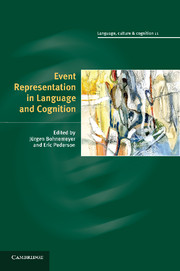Book contents
- Frontmatter
- Contents
- Figures
- Contributors
- Acknowledgments
- 1 On representing events – an introduction
- 2 Event representation in serial verb constructions
- 3 The macro-event property
- 4 Event representation, time event relations, and clause structure
- 5 Event representations in signed languages
- 6 Linguistic and non-linguistic categorization of complex motion events
- 7 Putting things in places
- 8 Language-specific encoding of placement events in gestures
- 9 Visual encoding of coherent and non-coherent scenes
- 10 Talking about events
- 11 Absent causes, present effects
- References
- Index
1 - On representing events – an introduction
Published online by Cambridge University Press: 01 March 2011
- Frontmatter
- Contents
- Figures
- Contributors
- Acknowledgments
- 1 On representing events – an introduction
- 2 Event representation in serial verb constructions
- 3 The macro-event property
- 4 Event representation, time event relations, and clause structure
- 5 Event representations in signed languages
- 6 Linguistic and non-linguistic categorization of complex motion events
- 7 Putting things in places
- 8 Language-specific encoding of placement events in gestures
- 9 Visual encoding of coherent and non-coherent scenes
- 10 Talking about events
- 11 Absent causes, present effects
- References
- Index
Summary
This volume presents a collection of essays reporting on new research into the relationship between event representations in language and mind. In recent decades, linguists have increasingly invoked the notion of ‘events’ – under this and other labels – in modeling the meanings of natural language expressions. Indeed, numerous aspects of the structure of human languages are now commonly seen across theories and frameworks as geared towards the task of expressing event descriptions.
Like many of the constructs of semantic analysis and theory, the concept of ‘event’ has been influenced by the work of philosophers and natural scientists, usually with no more than a passing acknowledgment of the puzzles and controversies besetting its philosophical treatment (see Pianesi and Varzi 2000 for an overview). Philosophers have referenced the concept since antiquity, especially in treatments of causality (the subordinate notion of ‘actions’ has been used even longer in moral philosophy). However, events and their properties do not appear to have become topics of ontological research before the twentieth century, and their status must at present be considered far from settled. Even more glaring is the contrast between the rich and imposing architecture of event representations in language envisioned by many semanticists and the limited and scattered research on the status, nature, and role of event representations in the cognitive processing of perception and action by psychologists.
- Type
- Chapter
- Information
- Event Representation in Language and Cognition , pp. 1 - 12Publisher: Cambridge University PressPrint publication year: 2010
- 3
- Cited by



